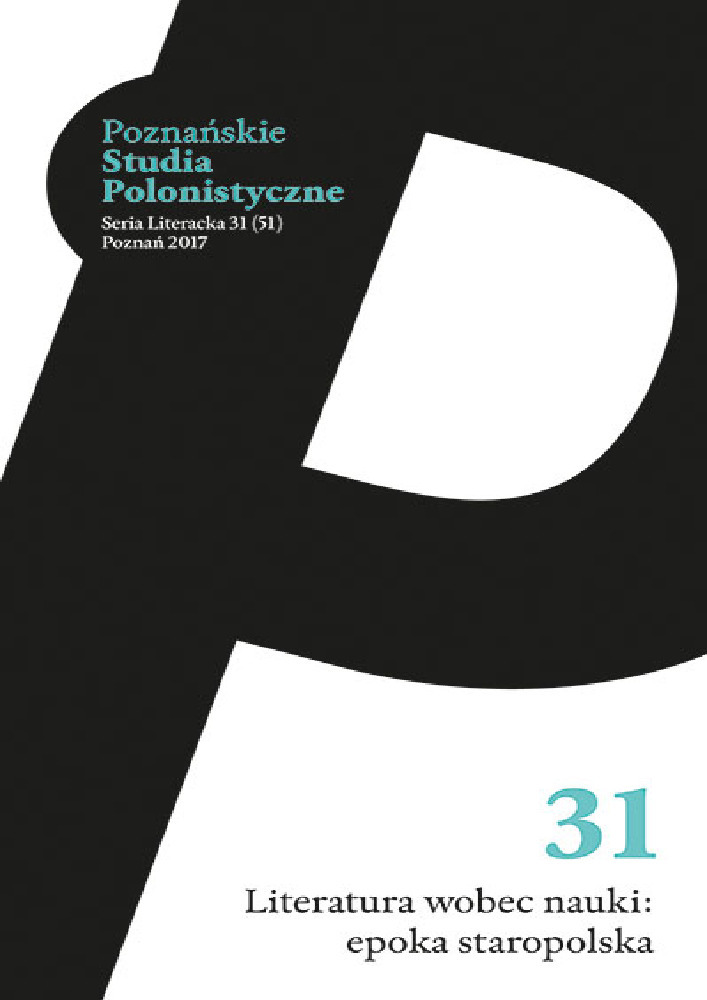Abstract
Stanisław Lubieniecki (1623-1675), best known for his work as a historian and theologian of the Polish Brethren, published also the Theatrum cometicum (Amstelodami 1666-1668) devoted to cometary studies. The first volume of that book contains the author’s astronomical correspondence with dozens of more or less renowned scholars of various fields of knowledge. By initiating scientific correspondence, Lubieniecki attempted to act as an intermediary in conveying information in 17th century Res Publica Litteraria. The article explains this activity on the basis of several examples: the issue behind the total number of comets in 1664 and 1665, the phenomenon in the Andromeda Galaxy and Lubieniecki’s correspondence with Henry Oldenburg. It shows how a layman in the world of science seeks to find a place for himself in the republic of scholars.Funding
Artykuł powstał w ramach projektu finansowanego przez NCN (nr decyzji DEC-2014/15/N/HS3/01305).
References
Barker Peter, Goldstein Bernard R. (1988), The Role of Comets in the Copernican Revolution, „Studies in History and Philosophy of Science”, t. 19, nr 3, s. 299-319.
Boas Hall Marie (1965), Oldenburg and the Art of Scientific Communication, „The British Journal for the History of Science”, t. 2, nr 4, s. 277-290.
Burke Peter (1999), Erasmus and the republic of letters, „European Review”, t. 7, nr 1, s. 8-15.
Burke Peter (2000), A Social History of Knowledge. From Gutenberg to Diderot, Polity Press, Cambridge [Wielka Brytania].
Dobrzycki Jerzy, Włodarczyk Jarosław (2002), Historia naturalna gwiazdozbiorów, Prószyński i S-ka, Warszawa.
Fumaroli Marc (1988), La république des lettres, „Diogène”, nr 143, s. 131-150.
Huygens Christiaan (1893), OEuvres complètes de Christiaan Huygens. Tome cinquième, correspondance 1664-1665, Société Hollandaise des Sciences, La Haye.
Huygens Christiaan (1895) OEuvres complètes de Christiaan Huygens. Tome sixième, correspondance 1666-1669, Société Hollandaise des Sciences, La Haye.
Kowalik Janina (1981/2), Stanisław Lubieniecki: företrädare för socinianerna och svensk korrespondent, „Karolinska förbundets årsbok”, r. 1981/2, s. 148-173.
Kowalik Janina (2003), Szwedzka korespondencja Stanisława Lubienieckiego, „Odrodzenie i Reformacja w Polsce” t. 47, s. 177-190.
Kronk Gary W. (1999), Cometography. A Catalog of Comets. Volume 1: Ancient – 1999, Cambridge University Press, Cambridge [Wielka Brytania].
Lubieniecki Stanisław (1666), Theatri Cometici pars posterior, apud Franciscum Cuyperum, Amstelodami.
Lubieniecki Stanisław (1668) (1), Theatri Cometici pars prior, apud Franciscum Cuyperum, Amstelodami.
Lubieniecki Stanisław (1668) (2), Theatri Cometici exitus, apud Franciscum Cuyperum, Amstelodami.
Matuszewski Adam (2012), Republica litteraria - siedemnastowieczna idea i próby jej realizacji, „Kwartalnik Historii Nauki i Techniki”, t. 57, nr 2, s. 131-142.
Oldenburg Henry (1966), The Correspondence of Henry Oldenburg. Vol. III, 1666-1667, wyd. i przekł. Alfred Rupert Hall, Marie Boas Hall, University of Wisconsin Press, Madison [Stany Zjednoczone].
Pomian Krzysztof (1974), De la lettre au périodique : la circulation des informations dans les milieux des historiens au XVIIIe siècle, „Organon”, t. 10, s. 25-43.
Przypkowski Tadeusz (1959), Zainteresowania matematycznoastronomiczne Braci Polskich, w: Studia nad arianizmem, red. Ludwik Chmaj, Państwowe Wydawnictwo Naukowe, Warszawa, s. 391-424.
Rossi Paolo (2001), The Birth of Modern Science, przeł. Cynthia De Nardi Ipsen, Blackwell Publishing, Oxford [Wielka Brytania].
Schultz David (2012), The Andromeda Galaxy and the Rise of Modern Astronomy, Springer, New York [Stany Zjednoczone].
Rochot Bernard (1966), Le p. Mersenne et les relations intellectuelles dans l’Europe du XVIIe siècle, „Cahiers d’Histoire Mondiale”, t. 10, nr 1, s. 55-73.
Tazbir Janusz (1961), Stanisław Lubieniecki. Przywódca ariańskiej emigracji, Państwowe Wydawnictwo Naukowe, Warszawa 1961.
Tazbir Janusz (2003), Stando lubentius moriar. Biografia Stanisława Lubienieckiego, Iskry, Warszawa.
Yeomans Donald K. (1999), Komety. Od starożytności do współczesności, w mitach, legendach i nauce, przeł. Andrzej S. Pilski, Prószyński i S-ka, Warszawa.
License
Authors
Authors of texts accepted for publication in „Poznańskie Studia Polonistyczne. Seria Literacka” are required to complete, sign and return to the editor's office the Agreement for granting a royalty-free license to works with a commitment to grant a CC sub-license.
Under the agreement, the authors of texts published in „Poznańskie Studia Polonistyczne. Seria Literacka” grant the Adam Mickiewicz University in Poznań a non-exclusive, royalty-free license and authorize the use of Attribution-NoDerivatives 4.0 International (CC BY-ND 4.0)Creative Commons sub-license.
The authors retain the right to continue the free disposal of the work.
Users
Interested Internet users are entitled to use works published in „Poznańskie Studia Polonistyczne. Seria Literacka” since 2016, for non-commercial purposes only, under the following conditions:
- attribution - obligation to provide, together with the distributed work, information about the authorship, title, source (link to the original work, DOI) and the license itself.
- no derivatives - the work must be preserved in its original form, without the author's consent it is not possible to distribute the modified work, such as translations, publications, etc.
Copyrights are reserved for all texts published before 2016.
Miscellaneous
Adam Mickiewicz University in Poznań retains the right to magazines as a whole (layout, graphic form, title, cover design, logo etc.).
